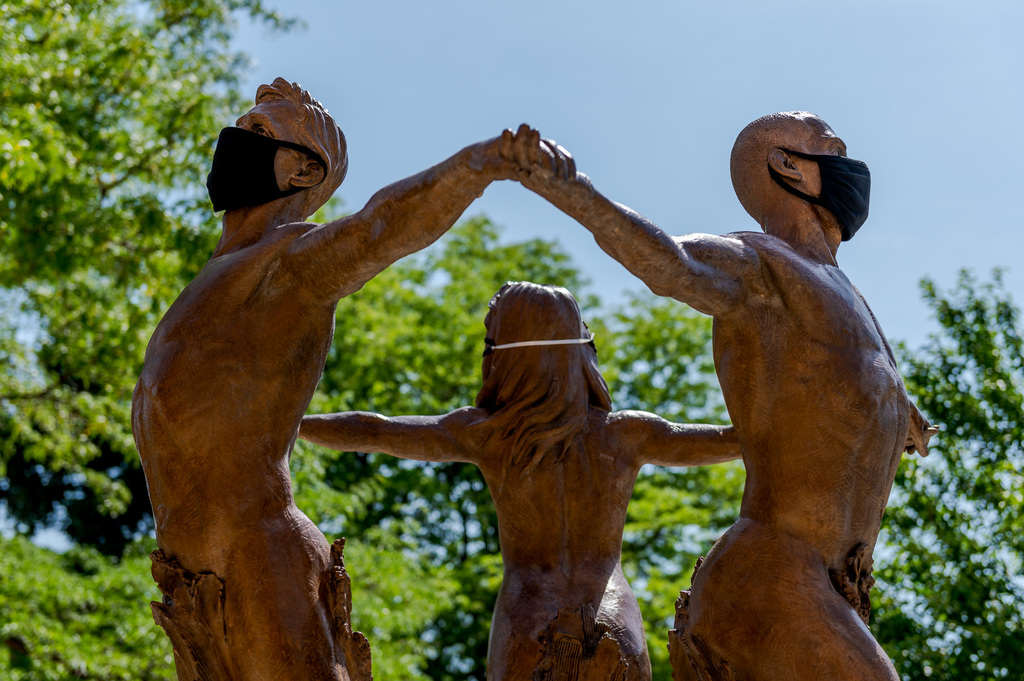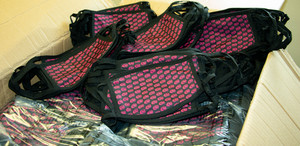CSC's COVID-19 response reliant on cooperation

CHADRON – Chadron State College students and employees will have an integral role in the success of the college’s fall semester, according to Vice President of Enrollment Management, Marketing and Student Services Jon Hansen, who leads the COVID-19 Implementation Team.
The Implementation Team was established in the spring to help campus prepare for the beginning of the fall semester by following guidelines from the Centers for Disease Control and Prevention, the Nebraska State College System Office, the Governor’s Directed Health Measures, and Panhandle Public Health District.
Since June 29, the Implementation Team has issued weekly emails to the campus community including updates on developments such as the purchase of personal protective equipment, signage for traffic flow in campus buildings, and screening procedures. The college’s COVID-19 web page has also been redesigned to better reflect resources and efforts by many departments on campus.
“(Everyone on campus) can make a crucial difference in the way they approach this situation. Develop a habit of embracing the three Ws: Wash your hands, Wear a mask, and Watch your distance. The campus community is a lot of people in close proximity. We need to follow these simple guidelines to be able to stay on campus,” Hansen said. “Wearing a mask helps. It takes some patience and perseverance. However, with time, it becomes easier and more natural.”
As the administration gathers scientific information and discusses it, they have a clearer picture of the overall situation and specifically where CSC sits in that environment, according to Hansen.
Hansen reminds students and employees they have an obligation to be considerate of others and, in return, they should also expect to be treated with dignity and respect. Personal responsibility and clear communication are central tenets of CSC’s guidelines.
“We all need to get along, from those who are very concerned to those who are less concerned. This may be one the most important things we can learn throughout this entire situation,” Hansen said.
After making initial, fast-paced decisions in mid-March to move all classes to remote methods, college administrators continue to assess the situation and make well-informed plans for long-term safety in academic classrooms, labs, dining areas, recreation, and living spaces when on-campus classes resume Aug. 17.
“Faculty, staff, and students all responded exceptionally well to our pivot in mid-March. It was heartwarming to see everybody come together and complete the spring semester successfully,” Hansen said. “You can prepare for things that have happened elsewhere or that occur here from time to time, but this is unique.”
Because of the distinctiveness of the pandemic and how it affected everyone on campus, Hansen said questions submitted to the President’s Cabinet a few days before all-campus video meetings in April and May 28 were helpful. He said about 130-150 attendees joined the online meetings.
“My observation is that the Zoom meetings were mutually beneficial for Cabinet, faculty, and staff. For example, we might have known a certain topic was of interest, but maybe didn’t realize the extent of interest beforehand. Plus, the campus community could see the issues Cabinet is already aware of and working on,” Hansen said. “It was a great opportunity for dialog. It would be a good thing to continue. We’ll see how it develops.”
In June, Cabinet also hosted interactive video conferences for new fall 2020 students and returning students. Recordings were available to both groups afterward.
“The students had good questions and were very excited to be returning to campus,” Hansen said. “We want to continue student activities as uninterrupted and unchanged as possible. Three things go into that equation: wearing masks, managing the size of gatherings, and maintaining social distancing. We will be monitoring, evaluating, and controlling activities through density, modality, and venue.”
Category: Campus News

